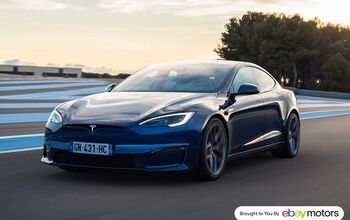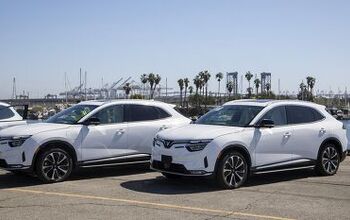Trade War Watch: Ford Blames Trump for Sky-high Steel Prices

Ford Motor Co. is blaming Donald Trump’s commodity tariffs for elevating U.S. steel prices higher than any other market on the planet. Regardless of your opinion on the president’s policies (the economy is reportedly booming), it’s a little hard to rebuff Ford’s criticisms on this one. The automaker’s now going straight to the source in an attempt to remedy the situation.
Trump hasn’t gone easy on Ford. He spent a large portion of his presidential campaign coming down on the automaker over its plan to move small-car production to Mexico. However, the company’s about-face proved a short-lived victory — it ultimately decided to stop selling cars altogether. This was followed by Ford’s cull of the upcoming Focus Active in North America after Trump’s 25 percent levy on Chinese-built vehicle made the introduction impossible (and unprofitable).
While it’s relatively easy to paint Trump as the villain in this picture, China actually imposes even higher import tariffs (40 percent) on vehicles coming from the United States. Ford’s attempts to bolster volume in that market haven’t met with much recent success. Meanwhile, the administration’s decision to re-examine Obama-era fuel economy standards threw every automaker a bone.
If anything, this is a conflict of interests. Trump doesn’t want the United States to lose any more ground to China than it already has, and Ford needs to make money. A feud was inevitable.
“U.S. steel costs are more than anywhere else in the world,” Joe Hinrichs, Ford’s president of global operations, said during Monday’s production launch of the Ford Ranger.
According to Bloomberg, the executive said Ford has reached out to administration to see what can be done. “We tell them that we need to have competitive costs in our market in order to compete around the world,” Hinrichs confirmed.
Last month, Ford CEO Jim Hackett urged the White House to end trade disputes as quickly as possible. He said the company experienced a $1 billion blow to its bottom line, despite procuring the majority of its steel from within the United States.
From Bloomberg:
Domestic hot-rolled coil — the benchmark price for American-made steel — has gained 28 percent in 2018 as the Trump administration implemented tariffs on imports. The levies helped push prices to about $920 a metric ton earlier this year, the highest in a decade. U.S. steel currently costs about $260 more per short ton than steel in China, which accounts for more than half of global demand.
“We encourage all counties — but especially the U.S. and China — to work together,” Hinrichs said. “We think it’s in the global economy’s interest to do so.”
We don’t see that happening any time soon. China would have very little to gain by playing nice with the United States, given that almost every company in the world is desperate to do business there. Likewise, Trump has made The People’s Republic one of his chief economic concerns, and the president doesn’t have a history of being the first to extend an olive branch.
[Image: Ford Motor Co.]

A staunch consumer advocate tracking industry trends and regulation. Before joining TTAC, Matt spent a decade working for marketing and research firms based in NYC. Clients included several of the world’s largest automakers, global tire brands, and aftermarket part suppliers. Dissatisfied with the corporate world and resentful of having to wear suits everyday, he pivoted to writing about cars. Since then, that man has become an ardent supporter of the right-to-repair movement, been interviewed on the auto industry by national radio broadcasts, driven more rental cars than anyone ever should, participated in amateur rallying events, and received the requisite minimum training as sanctioned by the SCCA. Handy with a wrench, Matt grew up surrounded by Detroit auto workers and managed to get a pizza delivery job before he was legally eligible. He later found himself driving box trucks through Manhattan, guaranteeing future sympathy for actual truckers. He continues to conduct research pertaining to the automotive sector as an independent contractor and has since moved back to his native Michigan, closer to where the cars are born. A contrarian, Matt claims to prefer understeer — stating that front and all-wheel drive vehicles cater best to his driving style.
More by Matt Posky
Latest Car Reviews
Read moreLatest Product Reviews
Read moreRecent Comments
- Dr.Nick What about Infiniti? Some of those cars might be interesting, whereas not much at Nissan interest me other than the Z which is probably big bucks.
- Dave Holzman My '08 Civic (stick, 159k on the clock) is my favorite car that I've ever owned. If I had to choose between the current Civic and Corolla, I'd test drive 'em (with stick), and see how they felt. But I'd be approaching this choice partial to the Civic. I would not want any sort of automatic transmission, or the turbo engine.
- Merc190 I would say Civic Si all the way if it still revved to 8300 rpm with no turbo. But nowadays I would pick the Corolla because I think they have a more clear idea on their respective models identity and mission. I also believe Toyota has a higher standard for quality.
- Dave Holzman I think we're mixing up a few things here. I won't swear to it, but I'd be damned surprised if they were putting fire retardant in the seats of any cars from the '50s, or even the '60s. I can't quite conjure up the new car smell of the '57 Chevy my parents bought on October 17th of that year... but I could do so--vividly--until the last five years or so. I loved that scent, and when I smelled it, I could see the snow on Hollis Street in Cambridge Mass, as one or the other parent got ready to drive me to nursery school, and I could remember staring up at the sky on Christmas Eve, 1957, wondering if I might see Santa Claus flying overhead in his sleigh. No, I don't think the fire retardant on the foam in the seats of 21st (and maybe late 20th) century cars has anything to do with new car smell. (That doesn't mean new car small lacked toxicity--it probably had some.)
- ToolGuy Is this a website or a podcast with homework? You want me to answer the QOTD before I listen to the podcast? Last time I worked on one of our vehicles (2010 RAV4 2.5L L4) was this past week -- replaced the right front passenger window regulator (only problem turned out to be two loose screws, but went ahead and installed the new part), replaced a bulb in the dash, finally ordered new upper dash finishers (non-OEM) because I cracked one of them ~2 years ago.Looked at the mileage (157K) and scratched my head and proactively ordered plugs, coils, PCV valve, air filter and a spare oil filter, plus a new oil filter housing (for the weirdo cartridge-type filter). Those might go in tomorrow. Is this interesting to you? It ain't that interesting to me. 😉The more intriguing part to me, is I have noticed some 'blowby' (but is it) when the oil filler cap is removed which I don't think was there before. But of course I'm old and forgetful. Is it worth doing a compression test? Leakdown test? Perhaps if a guy were already replacing the plugs...


































Comments
Join the conversation
Good grief! My comment about the "high price" for steel, why then is steel scrap so pitifully low then?? Only $80 a ton. Someone's not being truthful here. And China, they've been getting away with murder for years, it's time they competed fairly with us. And technology, it's been proven that whenever technology increases, it creates more jobs than takes jobs away. This has been demonstrated over and over in our history.
Echos of the past. Relaxing of fuel standards for domestic products while the entirety of the rest of the world is tightening them. American products will lag far (farther) behind all foreign competition, further reducing demand from other countries. When these policies inevitably become untenable, American companies will be caught with their pants down (again) taking decades to catch up. Giving up on a world market, and the fastest growing ones, for some feel good nationalism.